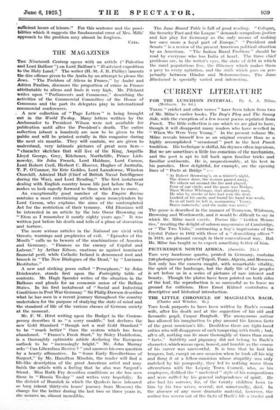THE MAGAZINES
THE Nineteenth Century opens with an article (" Palestine and Lord Balfour ") on Lord Balfour's " ill-advised expedition to the Holy Land." The writer (H. St. J. B. Philby) laments the dire offence given to the Arabs by an attempt to please the Jews. " The Problem of Aliens in France," by Andre and Adrien Paulian, discusses the proportion of crime in France attributable to aliens and finds it very high. Mr. Pilchard writes upon " Parliaments and Commerce," describing the activities of the Commercial Committee of the House of Commons and the part its delegates play in international commercial conferences.
r A new collection of " Page Letters " is being brought out in the World To-day. Many letters written by the Ambassador to President Wilson were not available for publication until after the President's death. The entire collection (about a hundred) are now to be given to the public and will be printed serially in this magazine during the next six months. They will contain, we are given to understand, very intimate pictures of great men here- " character sketches that will live of the King, Asquith, Lloyd George, Grey, Kitchener, Northcliffe, Prince Lich- nowsky, Sir John- French, Lord Haldane, Lord Curzon, Lord Robert Cecil, Herbert C. Hoover, Hughes of Australia, T. P. O'Connor, Sir Eric Geddes, Lord Lansdowne, Winston Churchill, Admiral Hall (Chief of British Naval Intelligence during the War), and Lord Reading." The first instalment dealing with English country house life just before the War makes us look eagerly forward to those which are to come.
An exceptionally good number of the Empire Review contains a most entertaining article upon moneylenders by Lord Carson, who explains the aims of the contemplated Act for the restriction of their tyranny. Old Etonians will be interested in an article by the late Oscar Browning on " Eton as I remember it nearly eighty years ago." It was written just before his death and tells of a place of starvation and torture.
The more serious articles in the National are vivid with threats, warnings and prophecies of evil. " Episodes of the Month " calls us to beware of the machinations of America and Germany. " Finance as the enemy of Capital and Labour," by Arthur Kitson, cautions us against imminent financial peril, while Catholic Ireland is denounced root and branch in " The New Dialogues of the Dead," by " Lucianus Restitutus."
A new and striking poem called " Persephone," by John Drinkwater, stands first upon the Fortnightly table of contents. Mr. Hugh Spender writes of the situation in the Balkans and pleads for an economic union of the Balkan States. In his first instalment of " Social and Industrial Conditions in Post War Germany " Sir Philip Dawson describes what he has seen in a recent journey throughout the country undertaken for the purpose of studying the state of mind and the standard of life of the various classes of German society at the moment.
Mr. F. W. Hirst writing upon the Budget in the Contem- porary describes it as " a sorry muddle," but declares the
new Gold Standard " though not a real Gold Standard " to be " much better " than the system which has been abandoned. " France's Fresh Start," by Sisley Huddleston, is a thoroughly optimistic article declaring the European outlook to be " increasingly bright." Mr. John Murray asks " Can Liberalism Revive ? " and answers his own question by a hearty affirmative. In " Some Early Recollections of Sargent," by Mr. Hamilton Minchin, the reader will find a life-like description of the great American artist and may finish the article with a feeling that he also was Sargent's friend. Miss Ruth Fry describes conditions as she has seen them in " Russia To-day " and writes very hopefully. In
the district of Buzuluk in which the Quakers have laboured so long (about thirty-six hours' journey from Moscow) the change for the better during the last two or three years is, she assures us, almost incredible.
The June Round Table is full of good reading. " Cologne, the Security Pact and the League " demands scrupulous justice and fair play for .Germany as the only means of making her once more a loyal part of Europe." " President and Senate " is a review of the present American political situation by an American. " The Indian Rural Problem " should be read by everyone who has India at heart. The three chief problems are, in the writer's eyes, the state of debt in which the rural populations live, the illiteracy which makes them a prey to every agitation, and the strife which goes on per- petually between Hindus and Mohammedans. The Juno Black-wood is specially varied and interesting.














































 Previous page
Previous page